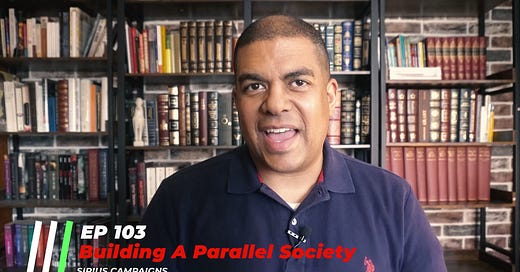The idea for this video—and now this post—came from a conversation with my daughter about her college plans for next year. She mentioned a program at the University of Austin (yes, the new one—not UT), where they’re trying to revive something rare in America: a real humanities education. The effort reminded me of Hillsdale College, that outpost in Michigan which manages to exist—thriving, even—without federal funds, not by charging $50,000 a year, but by relying on donors who believe in its mission.
It’s not just Hillsdale anymore. Small colleges with a classical vision are popping up in unlikely places, each standing apart from the melting educational establishment. And beneath them, a whole parallel system is quietly taking root. Classical charter schools are multiplying. Homeschooling is booming, with more parents quietly opting out, building micro-societies around their kitchen tables while the old system smolders.
That’s how I ended up homeschooling my own kids. I’ll admit, our version of “classical education” was a bit patchwork—Plutarch often lost out to algebra and the occasional science experiment—but the spirit was always there. That same impulse led me, years later, to apply to Hillsdale (didn’t get in) and then to Raulson College (didn’t get in there either) in hopes of studying Classical History more seriously. Eventually, I found another program and pursued an MA in Classical Studies—once both kids were off at college themselves.
Here’s the thing: I don’t spend much time in the bizarre world of the modern left. Pop culture isn’t on my radar, aside from the odd rewatch of Star Trek. My daily diet is more Plutarch than prime time, more Thucydides than TikTok. I stay current enough for my work as a campaign strategist, but honestly, the political story never really changes. The headlines are reruns of Roman debates—only with less gravitas, more stage makeup, and wit that feels written for a laugh track.
So yes, I’ve pulled back a bit. Not out of contempt (well, a little out of contempt) but out of necessity—a sort of managed distance. Enough to keep my edge as a professional, but not so much that I drown in the mundane, daily churn.
What’s interesting is how natural this parallel existence feels. I’m far from alone. The more I look around, the more I notice friends, neighbors, and fellow travelers quietly withdrawing—not into isolation, but into richer, smaller worlds of their own making. It isn’t a protest; it’s a preference. We don’t want the circus, so we built something sturdier and far less loud.
There’s a comfort in this rhythm. A sense that, while the old institutions play out their rituals and the official culture gets ever more performative, something more authentic is taking root beneath the surface—homes, schools, colleges, and communities that run on older, deeper currents. It’s not a withdrawal; it’s an upgrade. Less exposure to noise, more time for what matters.
If you find yourself here—reading history instead of doom scrolling, tending a garden instead of taking sides in the outrage Olympics—know that you’re in good company.
We’re not running away. We’re building a parallel society, one ordinary day at a time.










Share this post